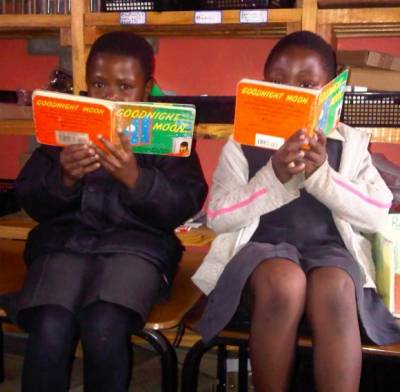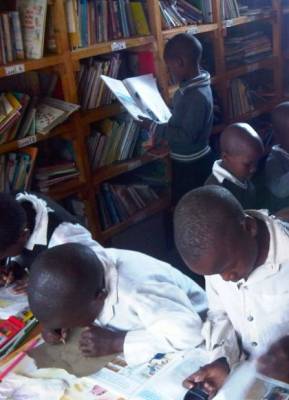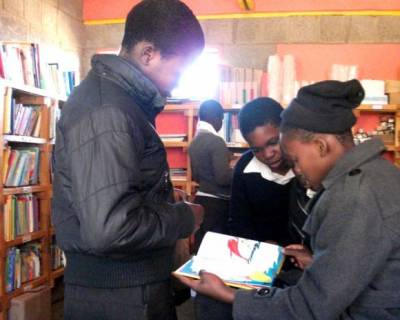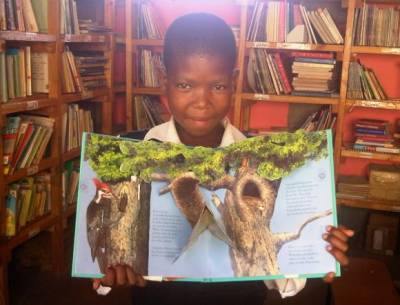The library at Mopeli Primary School is one of the happiest places I have adopted in my Peace Corps service. Built in a small storage room, it holds hundreds of children’s books donated through the African Library Project. It was formally set up by the volunteer before me with a system of selecting “librarians” from the 7th grade who help run it. Here I share my experiences at the library with the children who enjoy it so.
“There are perhaps no days of our childhood we lived so fully as those we spent with a favorite book.” – Marcel Proust
The mid-service existential crisis has hit and hit hard. I returned to the states over the holidays to spend an excellent two weeks amongst loved ones. There, I consumed more cheese and chocolate than I ever had let myself before with a “no limits” mentality. However, in the end, I had to get back on the plane to finish the rest of my service.

It isn’t that I don’t enjoy my Peace Corps service (quite the contrary), but more of an “Okay. So now I have to do this again?” Yet, as school started up and life became routine once more, I looked for the things that made me leave my home once again to get back on that plane. One of them is the library at Mopeli Primary School.
My desk is in the library, and I watch over the kids to make sure they don’t misuse the books. And, boy, is it popular.

Every day at lunch, this small space becomes jam packed as kids rush to pick up their favorite books before others do. Such favorites include Franklin (the turtle) books, Clifford the Big Red Dog, The Very Hungry Caterpillar, any and all pop-up books, The Disney Story Book Collection, a book about ducklings with a “quacking” button which the kids press incessantly, the Sara Comics which discuss heavy topics like HIV/AIDS for kids and, of course, Dora the Explorer.
As an avid reader myself, the library is best part of my day. Students know the drill – you write down your name and other details in the “check out notebook” when you take a book home and you must return it within two weeks. The librarians hang around my desk and help the little kids write their names in the book and sign them back when they return them.

Librarians like to think they have a big responsibility and nag many of the older students to check out books of a higher level; “What?! Level 1 book?! This is for babies! You are in the 6th grade!” I don’t kid myself in thinking that all of the books are checked out for the words on their pages. Even the older kids check out books just to look at the pictures.
I have often heard my colleagues say “Basotho people aren’t a reading culture. They much prefer television.” This is such baloney. To pick up a book and read it at your own will is an interest that develops over a long time. Most children in the USA, France and other “developed” countries had parents read to them when they were small. There are libraries in every town and city and the people around them read on a daily basis having access to newspapers, blogs, books, magazines and recipes. It is common knowledge that reading to your child and providing them with books is beneficial to their cognitive development. Yet, you have to have an economy and daily life routine which supports this lifestyle.

Here, most men and women work from dawn until dusk in the fields or in factories, if they even have work. After cooking, cleaning and working, there is little time for reading. Plus, that would have to be by candlelight since electricity is scarce. Then, access to books is limited. The only established public library in the country is the one in the capital city for the university students. These are some of the reasons Basotho grew up on oral storytelling, rather than reading books.
Many of the students who frequent the library not only do not have any other access to books, but to images either. Very few have a TV in their home and, so many are blown away by the images they see in the library for the first time. A kindergartener cracking up at the idea of a dog wearing clothes, kids asking me what kangaroos are and books that show pictures of black people doing all sorts of things; people that look like them. Books provide an infinite source of learning and everyone takes something different away from them. Whether it is reading or simply looking at pictures, these students are seeing the world beyond their village and shouldn’t be limited on what their culture expects from them or not.

The library isn’t only a place for checking out books. It is also a hang out spot for a lot of students. Every day, my desk is surrounded by 4 to 8 kids who are just chilling out, wanting to chat with me. Of course, they can only speak English to the English teacher, so it is an informal place of learning. I have various knickknacks on my desk including a wooden cat named Tsepo that the mother of Jay, my boyfriend, gave me, an American flag, colorful post-its, a squishy purple caterpillar named Charlie my grandmother sent and paper and colored pencils in case someone wants to draw. The door to the library is covered in said drawings. Charlie and Tsepo are especially popular and the kids like to play with them.
In Lesotho, most children make their own toys out of grass, sticks, rocks, wire and trash so an actual toy is a big deal. Far too often I have had to explain to my students that Charlie cannot be checked out like a book. “He is a librarian,” I say.

My mother’s French friend Dominique also sent me a calendar at the beginning of last year with family photos for each month. My student devoured this concept. On a regular basis, I was identified on every month; “Here is Madam Matsepo.” (Then looking at me to make sure I nod my head, turn the page to February and pointing to my 13 year old self) “Here is Madam Matsepo”. In this way, they have learned all of the names of my family members (which means they now ask me when they will come to visit them), what I looked like when I was their age and even some French. We have practiced the days of the week and the months in French so that sometimes I am now greeted with “Madam! We are in Marssssssssss now!” It makes my day.
I love having the library at my disposal. When I feel down, like I am not making a difference here or I am missing home, hanging out in the library always makes my day better. I get to know my students and they get to know me. We bond with new experiences. Like once, when there was a rank smell in the library and my students arrived for their daily book only to wrinkle their noses, look wildly around and start exclaiming “Rotten mouse!! Rotten mouse!” The rest of the afternoon was spent looking behind shelves and in boxes for where a dead carcass could be hiding. We never did find it but it was funny all the same.

My students know no one will beat them in the library, making it a safe place to explore, be creative and ask questions. I love hearing the first timers going over the books, “Wow! Oh WOW!” as they pull them off from the shelves. It is a place that stirs their imaginations; where plastic purple caterpillars can be librarians, pigs can wear tutus and dogs can be red. A place where something as boring as a book can pop out at you when you turn the page, feel soft like a rabbit like in Pat the Bunny, or even make noises. Here they are free to be themselves, take in everything, learn and make mistakes. For, after all, what better place to do that than a library where the whole world is available at the turn of a page?

